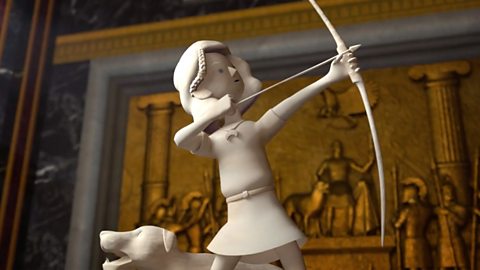What was the Roman army like?
The Romans needed a powerful army to invade foreign lands and defend their empire. But what exactly made the Roman army so successful? Find out below:
Find out more about how the Romans fought and organised their armies.
ANITA: The Romans in Scotland; the Roman army.
Hello, my nameтs Anita, my mums a history professor and my dadтs an engineer, he knows all about building things. Iтve got a project for school about the Romans and Iтve got one questionтІ
Why did the Romans come here?
DAD: It was a nice day out, they ate a lot of ice cream, and so they needed the exercise.
ANITA: Urgh Daaad!
MUM: The Romans wanted to conquer, to control as much of the world as they could. Probably so they wouldnтt be conquered themselves. They sent their armies out to conquer land, spreading further and further, from Rome across Europe.
They first invaded Britain in 55 BC, by 79 AD the Roman army came here. ImagineтІas many as 30,000 men marched into Scotland. And nobody organised an army quite like the Romans, they were a conquering machine.
The biggest group was a legion, 5,000 men commanded by a legit. Each legion was spilt up into cohorts of 480 men and again, each cohort was again split up into centuries ofтІ
ANITA: A hundred! A century is a hundred!
MUM: Normally yes but a Roman century was 80 men. The officers, who were in charge and gave orders, were called centurions. And each century was spilt up into ten groups of eight soldiers called a contuberniam.
They fitted into one tent and could live, work and fight together on their own, or, as part of the bigger army. This made the army very adaptable. When the army set up camp it was like a city would appear overnight.
DAD: The camp was even surrounded by deep ditches and high walls, all built by hand.
MUM: The Romans trained a lot, wearing armour made of steel hoops, which was both light and flexible, and could stop an arrow.
For fighting at a distance, a Roman soldier would throw a long, iron-tipped spear, called a pilum, made to bend when it hit the target. Which meant the enemy couldnтt pick up the spear and throw it back.
Up close, he would thrust a deadly stabbing sword called a gladius and they used a large shield called a scutum to protect themselves. Especially if they did thisтІ
ROMAN: TESTUDO!
DAD: Which is Latin for tortoise. Because the Romans ate a lot lettuce. But really, all those shields were like a tortoises shell, completely covering the soldiers hiding inside.
MUM: From within the testudo, the soldiers were very well protected from arrows. And if enemy soldiers got too close, gladius swords would stab out, slashing throats and ankles.
ANITA: OUCH!
MUM: I havenтt even mentioned catapults and ballista; war machines that could fire stones or giant arrows. The soldier's aim could be so good that they could hit a single person from three football pitches away.
VILLAGER: Ahhhh!!!
ROMAN: Roman language.
MUM: The Roman army was clever, well organised and disciplined. You ALWAYS had to do what you were told.
DAD: Oh thatтs YOU out of the Roman army!
ANITA: I ALWAYS listen, youтre the naughty one Dad.
DAD: Who?? Me?!
MUM: Right you two, march back to the car! Left, right, left, rightтІ
How was the Roman army organised?
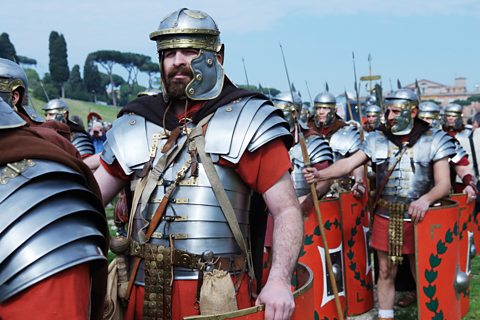
The Roman army was very well organised. It consisted of several distinct units.
Each army was called a legion. It consisted of 5,000 men and was commanded by an officer called a legate. The soldiers of the legion were called legionaries.
Each legion was spit into smaller parts of 480 men called a cohort.
Each of these cohorts was then divided into smaller groups of 80 men called a century. The leaders of these smaller groups was called a centurion.
These centuries were then further split up into eight groups of ten men. These small groups were called contuberniums.
Splitting their armies into smaller groups allowed the Romans to carry out a lot of task at the same time. Some soldiers could be used to guard the base while others could be used to build walls, roads, or forts.
It meant that the Roman army was very skilled and very flexible т it could do more than just fight.

Were soldiers all from Rome?
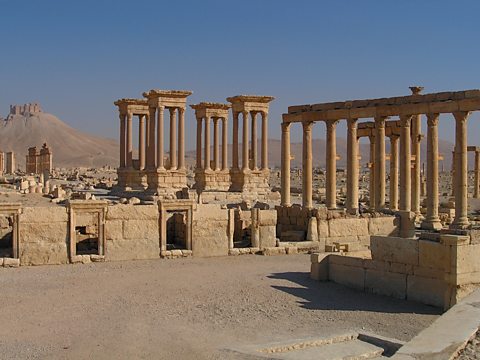
While some men in the army were from Rome, a lot of the soldiers in the Roman army came from other areas and countries.
As the Romans conquered more lands, these countries became part of the Roman Empire. The men from these lands became soldiers in the Roman armies.
For example, many of the soldiers that guarded Hadrian's Wall came from places such as Romania, Spain, and North Africa.
All Roman soldiers were professionals. They were paid for their services and signed up for a period of twenty-five years.
When their twenty-five year service was up т if they survived т they could then retire. Once they retired they were given land to live on and farm. This was quite a valuable gift so the Romans had little difficulty in recruiting new soldiers.
For the soldiers who came from the conquered lands, serving in the Roman army had another benefit т at the end of their service they became Roman citizens.
This meant that they were classed as free men rather than slaves. They then had more civil rights, such as the right to vote and the right for their children to be recognised as Romans, too.

What made the Roman army so good?
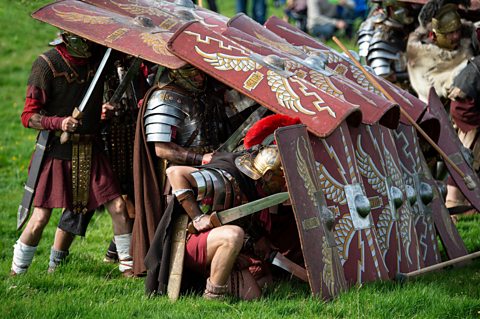
The Romans were the most successful army of the age and, wherever they went, they won war after war.
One of the main reasons for this was the Roman dedication to training and discipline. Roman soldiers spent a long time training and practicing their skills.
Roman soldiers were also taught to fight as a unit rather than as individuals. They fought in tight formations and protected themselves behind long shields. One such formation was called the testudo т which in Latin means тthe tortoiseт.
In the testudo formation, the Roman soldiers formed a tight square. The soldiers on the outside protected themselves and the others behind them with their shields. The soldiers in the middle placed their shields above the heads to protect everyone in the square from arrows and rocks.
When the enemy attacked and tried to break through the shield wall, the soldiers on the outside stabbed at them with their swords.
The Romans also had soldiers who were expert archers. They could accurately bombard an enemy with arrows from hundreds of metres away.
The Romanтs also had cavalry units. Mounted on trained horses, these soldiers charged at enemies to chase them off.
All of this training gave the Romans the edge when it came to battles.

What equipment did a Roman soldier have?
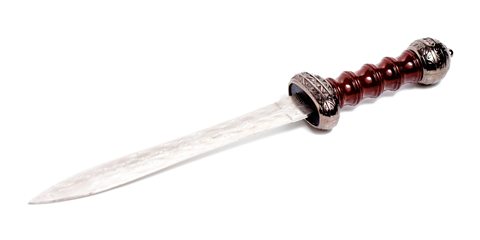
The Roman army was very well equipped. The typical Roman legionary had the following equipment:
- A long spear called a pilum
- A short sword designed for stabbing called a gladius
- A long, curved shield called a scutum
- A metal helmet called a galea
- Metal chest armour called lorica segmentata
- Leather boots or sandals with metal studs on the soles called caligae
Soldiers also carried their own cooking pots, a few daysт worth of food and water, and tools for digging ditches and constructing buildings and fortifications.
The Roman army had long, well-organised supply lines that stretch all over the empire. As such, wherever the army was, soldiers could get letters from home and new equipment such as new boots or clothing.

Click and learn: A Roman soldier's equipment
More on Romans
Find out more by working through a topic
- count3 of 9

- count4 of 9
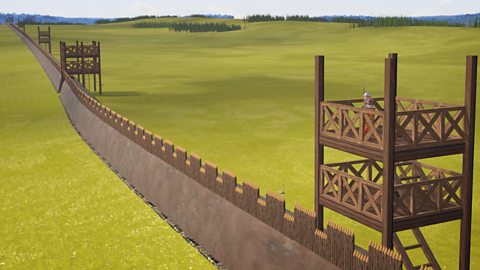
- count5 of 9
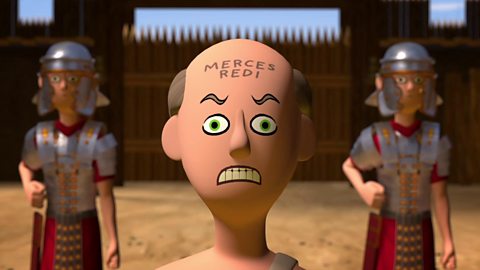
- count6 of 9
